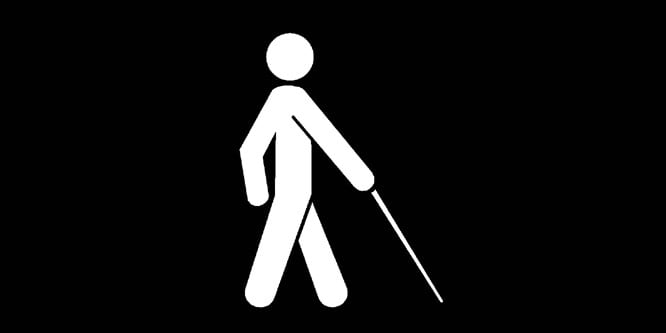
As the world observe White Cane Safety Day, the federal and provincial governments need to establish mobility training centres for the blind

Every year on October 15, the blind world over celebrate White Cane Safety Day, highlighting the achievements of the blind and create awareness about issues of the blind. Broadly speaking, there are three types of blind people, those who are congenitally blind, those who are partially sighted and those who lose sight at a later stage in their lives. As such, relationship of a blind person with white cane is characterised by the nature of his or her blindness.
While congenitally blind find it easier to use white cane, partially sighted and late blind find it difficult to start using white cane for their daily mobility needs. Accepting white cane is tantamount to accepting blindness which partially sighted and the late blind find extremely difficult to accept. Many partially sighted people pretend to be fully sighted and do not use white cane while it is obvious to people in their circle that they find it difficult to move around and negotiate with obstacles. Similarly, many people who become blind at a later stage in their lives do not use white cane despite its obvious advantages.
The dichotomy between the obvious advantages that the use of white cane entails in terms of independence in mobility and the inability of the partially sighted and the late blind to use white cane can be explained on four counts.
Firstly, the traumatic experience of living with partial sight and especially, losing such a precious and useful gift as sight hinders the way of accepting white cane which essentially means that you make an announcement to the whole world that you have gone blind. Secondly, as shared by Khalid Naeem, veteran disability rights activist, though availability of counselling services is better in Punjab and social case workers and psychologists have been appointed in special education centers, such services are not as widely available in other provinces as in Punjab. Generally, the partially sighted and those going through the traumatic transitioning from a sighted person to a blind get help through peer counselling. One such counselor was late Saima Ammar, a wonderful human being who provided such support to hundreds of such people and their families.
Thirdly, shocking it may sound but the fact is that there is only one mobility training centre for the blind in the entire country. Lastly, such is the pathetic condition of our roads, footpaths and built environment overall that even sighted find it difficult to walk around let alone the partially sighted and the late blind at the early stages of learning to move around with white canes.
Those Pakistani blind who experience walking around with their white canes in the built environment designed to cater to the special needs of the people with no sight in other countries feel immense sense of freedom and independence. The relevant authorities need to ensure that accessibility codes are incorporated in the design of footpaths and buildings. Federal and provincial governments need to establish mobility training centres for the blind. Furthermore, there is urgent need for establishing national helpline service to provide counselling service to the blind and their families.
As it is White Cane Safety day on Monday, October 15, let me indulge to share a poem written in Urdu by Saima Ammar who was a role model for thousands of Pakistani blind people and which I translated in English and built upon to share with readers the innermost feelings of a blind person.
Unseen
By Saima Ammar
The thought that from my sightless eyes
May drip sight when I blink next time
Saddens me,
Saddens me to the core of my heart.
Forlorn I stand and think, think of precious things
That the sight thus bestowed will snatch, snatch forever.
I think of reading, reading and writing by touch,
Climbing stairs, climbing stairs with measured steps,
Colours, forever revealing and concealing colours,
Rain, falling rain and the music of falling rain drops,
Leaves and the feel of my fallen leaves collection.
Of these things, and many more, I think as I stand forlorn.
As I stand forlorn, I think, I think
Of muted protests and perseverance shown
Against all odds, all odds tiny and great.
I think, think of the tapping sound, tapping sound of my white cane,
I think, think of the state of a mind lost, lost after having lost the way.
I think, I think of his thoughts, mind blowing thoughts
Flying me on their wings, higher, higher still
And taking me to distant lands, lands unseen, unseen by human eyes.
I think, I think of a voice, his voice
And the way it makes me turn, turn to him.
Of these things I mourn, as I stand forlorn.
Yes, with the bestowed sight, I’ll be able to see flowers,
Oh yes beautiful flowers and with them dust also.
Oh yes, the bestowed sight will make me see things,
All the things and all my near and dear ones
That all my life I’ve seen with sightless eyes.
The bestowed sight will make me see, see them all
And shake and break my very being to its core.
Forlorn I stand and think, think of precious things
That the sight thus bestowed will snatch, snatch forever.